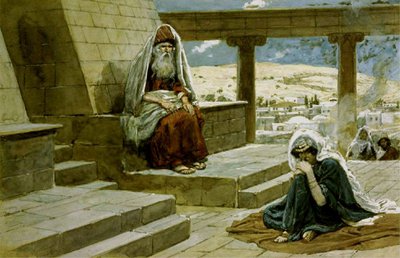Thoughts for the Day
Monday, 1st July 2024: Samuel: 1
1 Samuel 1 Eli Prophet Hannah
Reading : Verses from 1 Samuel, Chapter 1

There was a certain man, whose name was Elkanah.... He had two wives; the name of one was Hannah, and the name of the other Peninnah. Peninnah had children, but Hannah had no children. Now this man used to go up year by year from his town to worship and to sacrifice to the Lord of hosts at Shiloh, where the two sons of Eli, Hophni and Phinehas, were priests of the Lord. On the day when Elkanah sacrificed, he would give portions to his wife Peninnah and to all her sons and daughters; but to Hannah he gave a double portion, because he loved her, though the Lord had closed her womb. Her rival used to provoke her severely, to irritate her, because the Lord had closed her womb. So it went on year after year; as often as she went up to the house of the Lord, she used to provoke her. Therefore Hannah wept and would not eat. Her husband Elkanah said to her, ‘Hannah, why do you weep? Why do you not eat? Why is your heart sad? Am I not more to you than ten sons?’
After they had eaten and drunk at Shiloh, Hannah rose and presented herself before the Lord. Now Eli the priest was sitting on the seat beside the doorpost of the temple of the Lord. She was deeply distressed and prayed to the Lord, and wept bitterly. She made this vow: ‘O Lord of hosts, if only you will look on the misery of your servant, and will give to your servant a male child, then I will set him before you as a nazirite until the day of his death. He shall drink neither wine nor intoxicants, and no razor shall touch his head.’
As she continued praying before the Lord, Eli observed her mouth. Hannah was praying silently; only her lips moved, but her voice was not heard; therefore Eli thought she was drunk. So Eli said to her, ‘How long will you make a drunken spectacle of yourself? Put away your wine.’ But Hannah answered, ‘No, my lord, I am a woman deeply troubled; I have drunk neither wine nor strong drink, but I have been pouring out my soul before the Lord. Do not regard your servant as a worthless woman, for I have been speaking out of my great anxiety and vexation all this time.’ Then Eli answered, ‘Go in peace; the God of Israel grant the petition you have made to him.’ And she said, ‘Let your servant find favour in your sight.’ Then the woman went to her quarters, ate and drank with her husband, and her countenance was sad no longer.
They rose early in the morning and worshipped before the Lord; then they went back to their house at Ramah. Elkanah knew his wife Hannah, and the Lord remembered her. In due time Hannah conceived and bore a son. She named him Samuel, for she said, ‘I have asked him of the Lord.’
(Lectionary, New Revised Standard Version)
Thoughts
The books of 1 Samuel and 2 Samuel in the Hebrew scriptures (Old Testament) seem to have been originally written in one book, but became two when translated into Greek. Since the first book covers a period of about 115 years, it would have had more than one author. The first book looks at the birth of Samuel, the last of the Judges, to the death of Saul, the first of the Kings; while the second book is about David's forty year reign as King. One of the main themes of the book is the change from government by theocracy (ie God's Spirit chooses leaders) to a dynastic monarchy (where sons were often chosen as successors to the throne). When the book opens the situation is dire as the Philistines were fast reducing God's people to a subject race. But when all looked lost Samuel arose - to give education to the people and introduce the monarchy.
Today our story goes back to before Samuel's birth and the fact that Hannah could not bear a child. The Israelites offered sacrifices to God at Shiloh in the hill country some 30 miles north of present day Jerusalem. This is where Joshua had lodged the Tabernacle (portable place of worship, initially) that contained the Ark of the Covenant with the two tablets of the Law. The High Priest and 9th Judge was Eli (c1107-1067 BCE), who was to lead Israel for 40 years, as well as to train Samuel from his childhood.
We see in the passage above that Hannah is distraught at her situation, but instead of keeping her bitterness and anguish to herself, so that it eats at her heart and soul, she takes it to the Lord, and leaves with Eli's blessing that God will grant her the petition she craves. Today it's no different, we too must take our worries to God, and lay them on him praying that he will grant our petition as He thinks best for us.
Prayer
Lord God,
may we learn to take our
worries and concerns to You
rather than let them eat away at our soul.
Increase our trust in You
so that like a child turning to their father
we instinctively take our troubles to You,
knowing that You always have a solution.
Amen.
You might like to look at these: